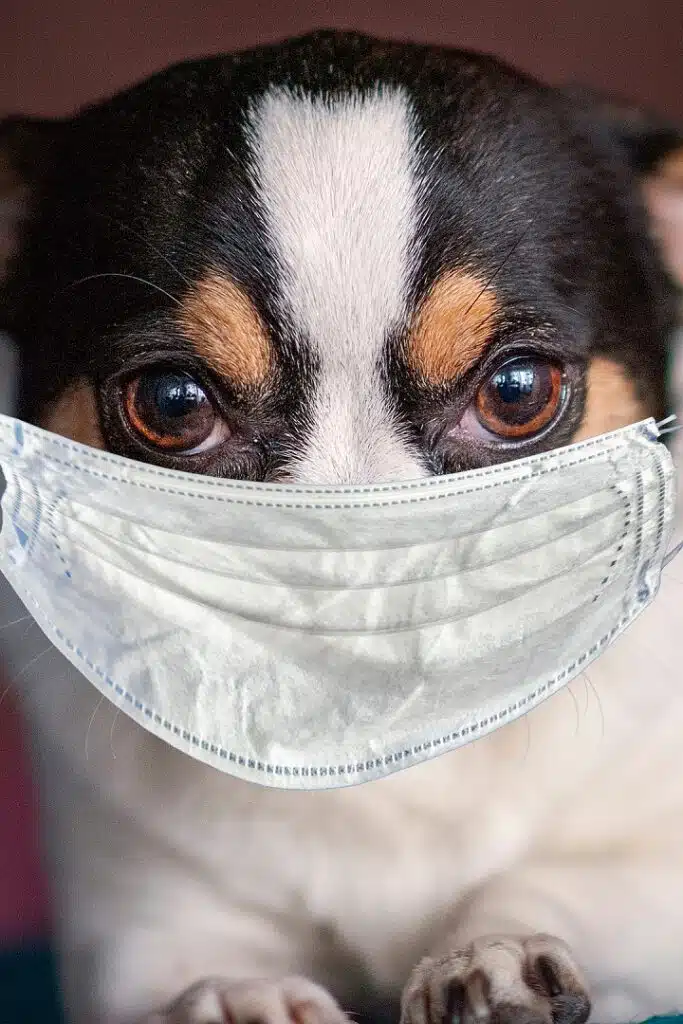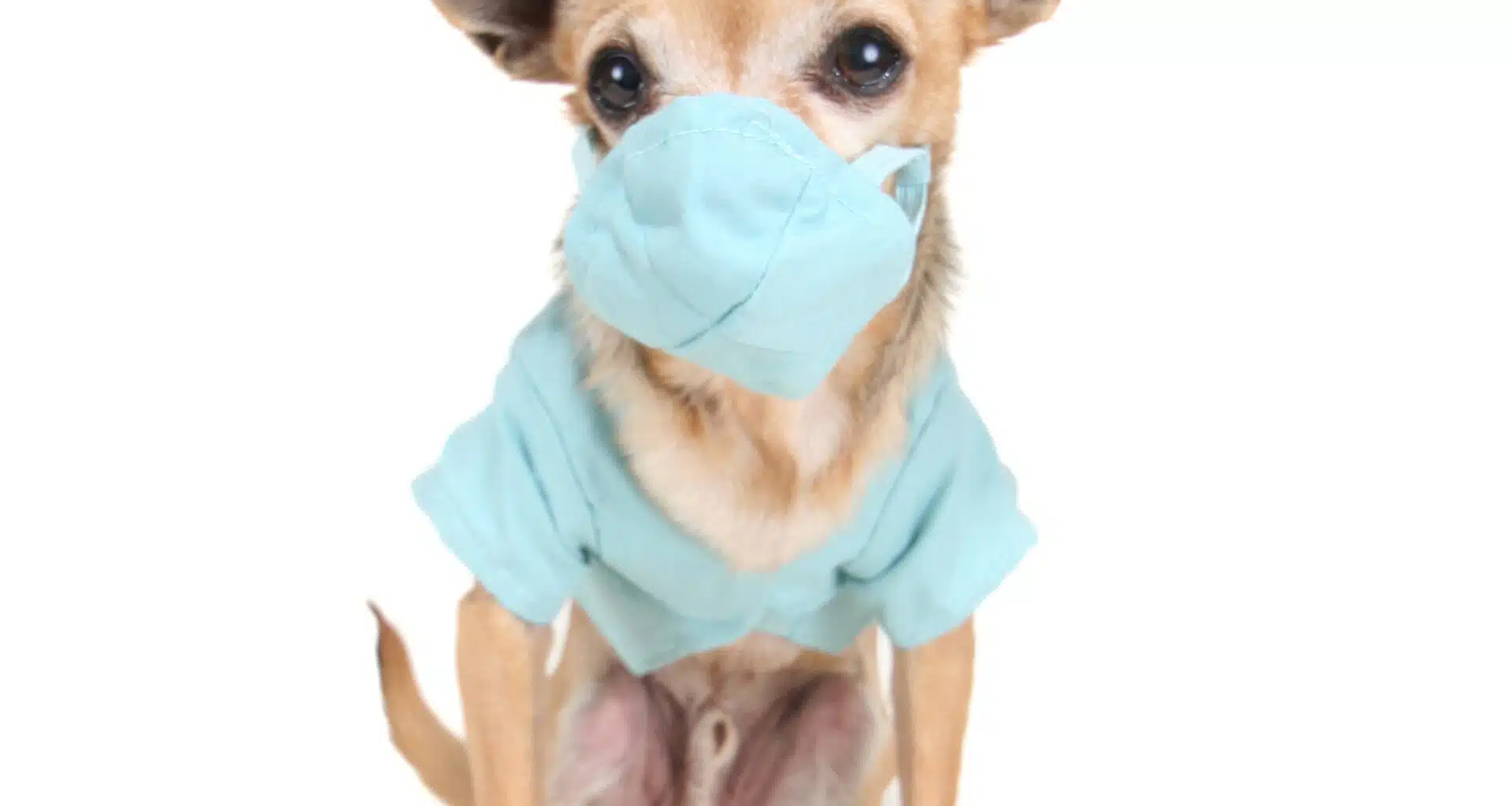When it comes to chihuahuas, the phrase “coronavirus (COVID-19) disease” has long been used to refer to a highly infectious intestinal disease that mostly affects puppies who are less than six weeks of age. The viral infection can cause abdominal discomfort and diarrhea for a few days but is usually mild.
The disease is most common in puppies who have been raised in crowded and unsanitary conditions—puppies who are also at higher risk of becoming infected with parvovirus. If a pup contracts both viruses at the same time, he may not recover.
There is a vaccination that can protect pups from a coronavirus infection, but it’s rarely administered.

Neither the American Animal Hospital Association (AAHA, the organization whose vaccination protocol guidelines are followed by most veterinarians) nor the American Veterinary Medical Association (AVMA) recommends the coronavirus vaccination for most chihuahuas or puppies.
The type of coronavirus that typically infects chihuahuas is not zoonotic; it doesn’t affect humans in any way.
“Coronavirus” is a sort of generic term for any one of a number of viruses that are named for the crown-like spikes on the surface of the virus when viewed by powerful microscopes. Some coronaviruses affect only animals and some affect humans.
The types that affect humans tend to cause mild to moderate upper-respiratory infections—what most of us would consider an ordinary “cold.” However, invulnerable or particularly susceptible individuals, the viruses can also cause bronchitis and pneumonia.
There has been a certain amount of comparing COVID-19 to “severe acute respiratory syndrome,” better known as SARS. COVID-19 and SARS are actually both coronaviruses (as is Middle East respiratory syndrome, better known as MERS).
So far, SARS and MERS both seem to be less infectious than COVID-19, but they both seem to cause a higher rate of fatalities than COVID-19 infections.
What’s Been Reported So Far
Here’s the only reason I (of all people) am writing about this: On February 28, there was a widely disseminated news report that the pet dog of a COVID-19 patient in Hong Kong had been tested for COVID-19 and the test resulted in a “weak” positive detection of the virus.
The health officials who tested the COVID-19 patient’s dog collected oral, nasal and rectal samples for testing; it’s unknown what made them decide to do this.
As it developed though, the dog’s nasal and oral samples “tested weak positive” for COVID-19 and the dog was placed in a veterinary quarantine facility for further observation.
A spokesman for the Agriculture, Fisheries and Conservation Department said the dog does not have “any relevant symptoms,” so the agency will conduct close monitoring of the dog and collect test further to confirm if the dog has really been infected with the virus or this is a result of environmental contamination of the dog’s mouth and nose.

The agency’s news release about the case also states that it has no evidence that pet animals can be infected with the COVID-19 virus or can be a source of infection to people.
And yet, confoundingly, the release went on to say that to ensure public and animal health, the department strongly advises mammalian pets of patients confirmed to have been infected with COVID-19 virus to be put under quarantine.
However, experts in this country have observed that any swabs of an infected patient’s environment, such as the doorknobs, television remote control, bathroom faucets, and so on, may also produce a positive test result due to “environmental contamination.”
Tragically, within days, there were reports of a record number of dogs and other pets being abandoned in China’s streets, and thousands of pets being surrendered to overwhelmed animal shelters—despite the fact that there is no indication that the COVID-19 virus is zoonotic.
Time magazine reports that the crisis for pet dogs and cats is the worst in Wuhan, the capital city of the Hubei province where the first cases of COVID-19 are believed to have emerged. Time reports that when a person in Wuhan is found to have COVID-19, the authorities kill all animals in the home as a precaution.
This report was corroborated by a reporter for the BBC (British news service):
“Volunteers in China say they’re struggling to keep up with the number of animals being abandoned as the country battles the virus outbreak.
More than 2,000 people in China have died and more than 78,000 infections have been reported in the country.
Pet owners who fall sick or are caught up in quarantine can’t take their animals with them, and despite reassurance from the World Health Organization that animals can’t carry the virus, others are being dumped.”
How to Protect Your Chihuahuas from Coronavirus
There is no evidence whatsoever to indicate that Chihuahuas ( any dog or cat ) can carry or transmit COVID-19. According to the Centers for Disease Control (CDC), at present, there is no evidence to suggest that dogs or cats will become a source of infection of COVID-19.
“It’s important to remember that viruses can sometimes infect a species but not cause illness in that species, nor become transmissible to others,” says the CDC.
And if you do become ill, you may well contaminate your chihuahua’s coat with droplets from your sneezes, coughs, or nose-blowing. Theoretically, someone else could contract the virus if they were to pet your virus-covered chihuahua! Accordingly, the CDC makes the following practical recommendations:
“You should restrict contact with pets and other animals while you are sick with COVID-19, just like you would around other people. Although there have not been reports of pets or other animals becoming sick with COVID-19, it is still recommended that people sick with COVID-19 limit contact with animals until more information is known about the virus.
When possible, have another member of your household care for your animals while you are sick. If you are sick with COVID-19, avoid contact with your pet, including petting, snuggling, being kissed or licked, and sharing food.
If you must care for your pet or be around animals while you are sick, wash your hands before and after you interact with pets and wear a face mask.”
But under no conditions whatsoever, should you abandon or surrender your chihuahua due to fears over COVID-19.







